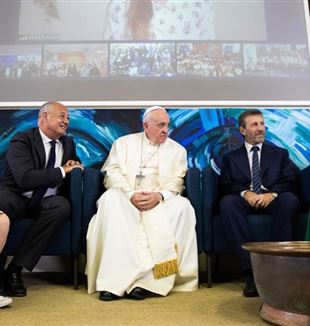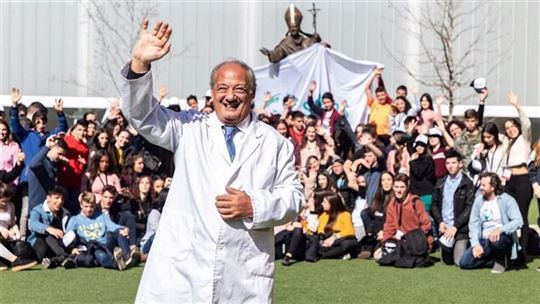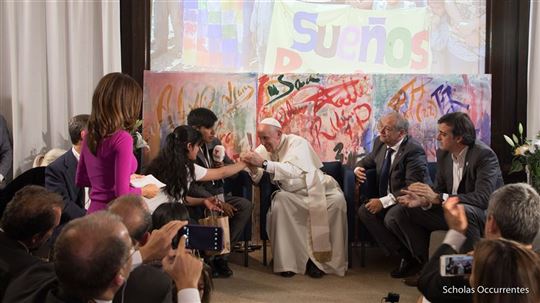
Education: With that "pact" in your DNA
On October 15, via video link, the meeting called by Pope Francis to "Rebuild the global educational pact". José Maria del Corral, founder of Scholas Occurrentes, talks about a story born from the encounter with Cardinal Bergoglio.It was supposed to take place in May, but because of Covid was re-organised for October 15, in a virtual form, as we have become accustomed to during the pandemic. The main content of the day, which the Pope called for, to "Rebuild the global educational pact", however, did not change. An initiative, a desire of Francis’, organised a long time ago in various stages; the last being in February 2019, with the meeting with the great imam of Al Azhar, Ahmad Al-Tayyeb, and the simultaneous signing of the "Document on Human Fraternity for World Peace and Living Together", and a few months later, in September, the actual launch of the event addressed to all "public figures who at the world level occupy positions of responsibility and care about the future of the new generations." During the streaming on October 15, which will be opened by a video message from Pope Francis, the first steps will be taken to build a global alliance between different cultures and religions, a "village of education". "Educating through encounter has always been a great concern of Francis’," recalled José Maria Del Corral, founder – along with Enrique Palmeyro - and president of "Scholas Occurrentes", an organization of Pontifical law since 2015, founded in Buenos Aires in 2001 by the then Cardinal Bergoglio and which today involves 450 thousand educational entities in 190 countries, with the aim of promoting "an education to be open to others, to listen to them in order to unite the pieces of a fragmented and increasingly ‘meaningless’ world, to start creating a new culture of encounter," explains Del Corral.
This "educational pact" is part of your history, of your genetic heritage. Is that so?
It all started in 2001. Argentina was going through a great political, economic and social crisis. Bergoglio had called hundreds of young people and educators of different faiths and cultures to a meeting in the Plaza del Mayo in Buenos Aires, where he planted an "olive tree of Peace", indicating a point of hope and life. I was the director of a training center and I took care of the young people who lived in the poor neighborhoods of the city, the villas. Faced with the crisis of the following months, with thousands of young people in the square demonstrating against "everything and everyone" between violence and clashes, I went to Francis and he posed my own question to me: "What can you do?” Hence the first proposal for a meeting with middle school students: about sixty in all, of various religions, public and private schools and different social classes. For six months they worked together, researching and studying the situation. Muslims, Jews, Evangelicals, Catholics and non-believers. Enthusiasm grew from week to week, to the point where they presented a bill to give space to education, meeting and dialogue. In the midst of chaos and social struggle, the Congress, for the first time in its history, voted unanimously on this law, 2169. The content was none other than the educational pact we are talking about.
The adventure began there, with neighbourhood schools, the first to be born from that experience. This then expanded.
Across the country and then abroad, with increasing recognition of what we did, which over time has become Scholas Occurrentes. But above all, it expanded parallel to Bergoglio's concern, who in the meantime became Pope, looking for a way to rebuild the educational pact that he saw as "broken" in school and training environments as well as in society, between poverty, racism, lack of future prospects and lack of meaning in life ...
In what way?
He has always said it himself, through three languages: "The language of the head, heart and hands. Three harmonious languages, so that they do what they feel and what they think, think what they feel and what they do, feel what they think and what they do, I believe that if we do not educate in this way, we lose." The proposal that we make, starting from this, is declined in a work starting from sport, technology and art.
And from the point of view of the method?
First of all, we have seen in these years that an education where the teacher speaks and the kids just listen, is not education. Last June 5, during a meeting with dozens of Scholas’ video-connected young people from all over the world, Francis himself reminded us: "Education creates culture, or does not educate. An education that does not listen, does not educate. Education teaches us to celebrate, or does not educate. Someone can say to me: "How? Is to educate not to know things?" This is knowing, but to educate is to listen, to create culture, to celebrate."
What does that mean? What do you mean?
Within these words, is the second aspect of the method: education cannot be only encyclopedic, you cannot only be communicating and learning notions. The third aspect of Francis' educational pact is that it celebrates the encounter, like the one he describes between young Palestinians and Israelis, against individualism: "In this new crisis that humanity is facing today, where culture has shown to have lost its vitality. I want to celebrate that Scholas, as a community that educates, as an intuition that grows, opens the doors of the University of the Sense. Because to educate is to see the meaning of things.”
If we do not truly educate, we lose the battle of our time, according to the Pope. Have you already seen any victory?
For example, an event that happened during the last months of lockdown. After a few weeks of lockdown, we were called by some teachers of Italian state schools. They asked for help. They were struggling to get in touch with their students via the web: "It is as though they are not interested in anything." Within three days, we set up an online meeting with some of Scholas: there were 60 of those students. The idea was not to teach them something, but to listen to them and learn about their problems and concerns. One of the students, for example, told us about his grandfather, who had been taken to the hospital, and he had not heard anything until he received a WhatsApp message saying that he had died. They lived together and he was left alone. Others, after him, began telling us what they were living. After three hours, no one wanted to disconnect. So we arranged a meeting the following week. And the same thing happened. In the end, we had 40 meetings in these months, with more and more young people, 2,600 from 137 cities around the world...
It was just a matter of intercepting them, of listening to what they had to say...
Another example comes to mind, from a few years ago, related to an intervention we did in San Antonio de los Cobres, a town in the province of Salta, in northern Argentina, invited by desperate teachers and parents. Six thousand inhabitants, two schools for a thousand students. And thirty boys who had committed suicide in the last year by jumping from what they called a "bridge of solutions". We began to work with the children, meeting them, listening to them and proposing a work mainly through art. For example, every Friday we would see a movie with them and stop to talk about it. Slowly, they also began to tell us about their fears and worries. They came up with an idea themselves: to paint the bridge, to give color and life to that structure. Two years have passed, and no one has jumped. Five of them went to the Pope and gave him one of the brushes they had used, thanking him for giving them the chance to look at life in a different way.
Read also - Carlo Acutis: The boy of miracles
"The encounter with the other is also an encounter with Christ," the Pope said several times, for example in Evangelii Gaudium: "The only way is to learn how to encounter others with the right attitude, which is to accept and esteem them as companions along the way, without interior resistance. Better yet, it means learning to find Jesus in the face of others, in their voices, in their pleas." Many people think that talking about encounter means giving up a part of oneself. The word "pact" itself can have the aftertaste of compromise... What is it like for you?
When you meet the other, you meet one equal to you, with your same heart. In the end you meet yourself. The culture of encounter is not uniformity, but the opportunity for diversity. One does not get lost, rather you change and become a source of change yourself. It is not a matter of having all the same brand of shoes. I remember the Pope’s words when he explained this by giving the example of Pentecost: the Holy Spirit did not make everyone speak the same language, but everyone understood each other. This is true for education: it is not necessary for everyone to speak the same language for there to be an encounter. And when this happens, you see it. You see the miracle of the change of a rich boy who after an encounter embraces the poor one. I gave my life for this. To see this miracle.